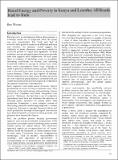| dc.description.abstract | SUMMARY This article tries to penetrate the superficial similarities in the ‘woodfuel crisis’ experienced by women in Kenya and Lesotho. In Lesotho, integration into the South African mine labour system has left many women as providers of their family's basic needs, including domestic fuel, in a situation of commoditisation without extreme land privatisation. In Kenya, privatisation has accompanied the conversion of woodfuel and other formerly common resources into commodities, with male wage migration an effect of the resulting marginalisation of smallholders, not a primary cause. Solutions to the ‘woodfuel crisis’ will be limited if they fail to take such underlying contrasts into account. RESUMEN Este artículo intenta profundizar en las aparentes semejanzas en la ‘crisis de la energía de leña’ experimentada por las mujeres de Kenya y Lesotho. En este último país, la integración al sistema de trabajo minero en Sud Africa, en un contexto de comercialización sin extrema privatzación de la tierra, ha convertido a muchas mujeres en proveedoras de las necedidades básicas de la familia, incluyendo la energía doméstica. En Kenya, en cambio, la privatización occurrió simultáneamente con la mercantilización de la leña y otros recursos anteriormente comunes, síendo la migración de los hombres asalariados, no una causa, sino un efecto de la resultante marginalización de los minifundistas. Las soluciones a la crisis de la leña serán limitadas si no se consideran estos contrastes subyacentes. RESUME Cet article essaie de pénétrer les ressemblances superficielles dans la ‘crise du bois’ que les femmes expériencent au Kenya et au Lesotho. Au Lesotho, l'intégration dans le système d'organisation de la main?d'oeuvre des mines d'Afrique du Sud, a laissé à bien des femmes la responsabilité de subvenir aux besoins essentiels de leurs familles, y compris le bois comme fuel domestique, dans un contexte où, d'une part, il est de plus en plus considéré comme un produit de consommation, et d'autre part la privatisation du sol n'a pas été totalement effectuée. Au Kenya, la privatisation a accompagné la reconversion du bois comme combustible et d'autres resources générales en produits de consommation, ayant pour conséquence la migration de la main?d'oeuvre masculine, résultat de la marginalisation des petits propriétaires et non pas sa cause essentielle. Les solutions à la crise du bois seront limitées si elles ne prennent en considération ces contrastes profonds. | en |

